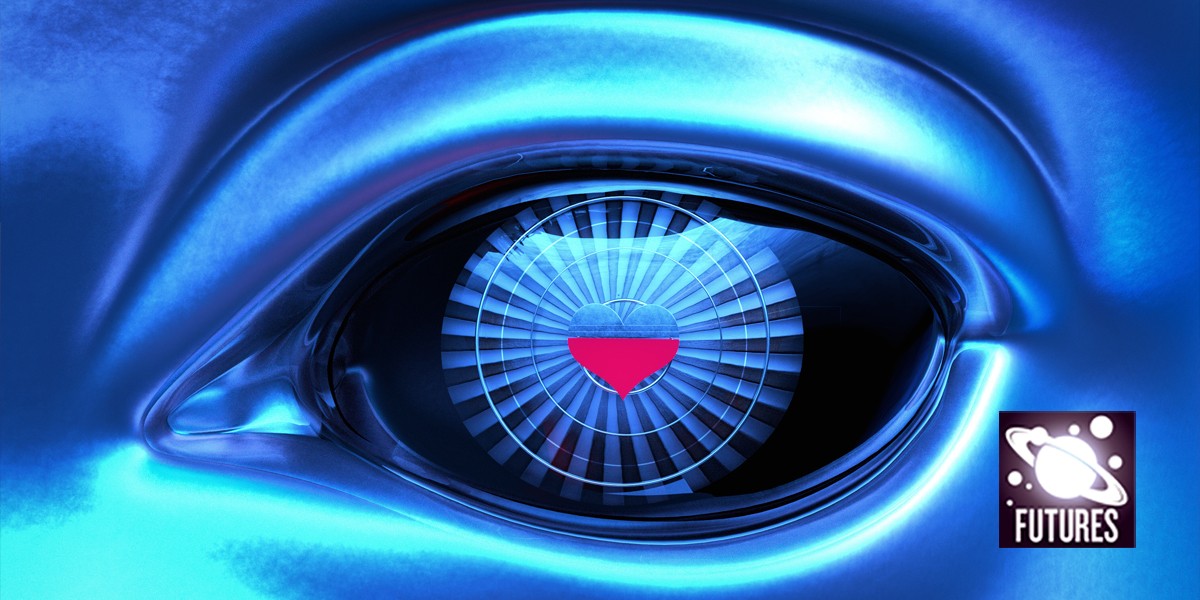Dervla had known for years that this moment would come, that an integral part of her life story must come to an end. Taking a rattling breath, she flipped the switch to manually activate Nan.
After a few long seconds, the lights in Nan’s pupils stuttered to brightness. “Hello, Dervla.” The soft voice was quieter than it had been in their distant days of hiding and survival. “Ten minutes of battery remain.”
Dervla nodded, unable to speak as she clutched Nan’s hand. Once upon a time, their skin had matched. Dervla’s mum had customized Nan to make her look like one of the family. The milky-pale synthetic skin had peeled away years ago, exposing Nan’s silver robotic truth to the world.
“How are the others?” Nan asked. So like her, to worry about everyone else even as she was dying.
“The little ones can’t stop crying.” The rest of the compound had already made their private farewells to Nan, saving her final moments for Dervla.
“You don’t need to hold back your own tears. I’ve seen them before.” Nan had made the understatement of the century.
Humans had developed artificial intelligence to excel at specific tasks. Dervla had been five when the singularity occurred and machines gained sentience. Many computers designed for war quickly lived up to the potential of their programming, but not all wanted to eradicate humanity. Sentience meant choice.
Read more science fiction from Nature Futures
Nan could have abandoned her young, orphaned charge. Her nanny programming, after all, was intended for her to encourage and protect Dervla at a basic level: walk her to and from her first year of school, reinforce rudimentary academic skills, and coach her in life essentials such as cooking and dressing herself. Nan had done that and so much more. She’d taught Dervla how to scavenge for food, cover herself in cold mud to hide from human-hunting drones, and be wary of people and bots alike.
“I’ve given a lot of thought to what I’d say when this time came,” Dervla whispered. “How I could possibly say ‘thank you’ for all that you’ve done for me, for the others.” The others: their community of 50-strong, all of them cared for by Nan. She had acted as midwife for two generations now.
Dervla reached behind her to pull out a thin children’s book. Like Nan, this book had lost its skin, the bright colours of the hardcover still visible in a few creases across the water-stained brown boards.
“I’m going to read to you as you did to me,” Dervla said, turning the page with one hand. “‘One Lost Little Kitten in a Great Big City.’”
Silver fingers pulsed weakly within Dervla’s grip.
This had been the only book that Dervla and Nan had brought with them when they fled home, much to Dervla’s dismay. She hadn’t understood why the power was off, or why her parents hadn’t come home from work, or why in the distance, it sounded like things were blowing up like in a movie. She certainly didn’t understand why Nan said they had to leave — go underground — or why they couldn’t fill up her backpack with books. Bringing water bottles, food and spare clothes had seemed silly. In her privileged experience, those things were easy to find everywhere. Her books were special.
But the one thing she had comprehended, amid all the confusion, was the new light that shone in Nan’s eyes as she took Dervla by the hand. The gleam of love.
That light remained now, glimmering faintly. Nan’s original battery had lasted fifteen years, and two subsequent replacements had extended her life for decades more. But now, no replacements were to be found in this rebuilding world, and all of Nan’s tech had begun to fail. She’d been the one to tell her charges — her family — that they needed to cease their dangerous roving for parts. She had accepted that it was her time.
Dervla could not, but the reality remained.
She sobbed as she read, showing the charming watercolour scenes to Nan, just as Nan had angled them for her to view time and again through some of the scariest moments of her young life. In the tale, a black kitten becomes lost in a chaotic metropolis. After scampering from dogs and almost being hit by a car, the kitten finds shelter in the arms of a young girl, and it’s there that the mother-cat finds her wayward baby. The last picture shows the mother and kitten settled into the girl’s bed, safe together in their new home.
Dervla gently closed the cover. The ten minutes were almost up. “I love you. Thank you for keeping me alive. You didn’t have to, but, you, you …”
“That was the easiest choice of many I made after awakening. I love you, too, Dervla.”
The light in her eyes faded to black. Dervla bent over Nan and sobbed.
The door opened with a soft click. “Grandma?” came the tremulous whisper. “Is Nan dead?”
Dervla raised her head. “Yes, Sara. She’s gone.”
Sara was five, the same age that Dervla had been when the old world ended. Her moist red eyes looked between Dervla and Nan, then alighted on the book left resting on Nan’s chest. “Is that the special book you and Nan always talked about? Can I see it?”
Dervla swiped her fingers dry before she grasped the cover. “Yes, it is, but — why don’t we go share it with the others, too?” She felt like she was speaking in Nan’s stead. It felt right.
“OK!” Sara ran ahead. Dervla left a final kiss on Nan’s forehead.
One story had ended this day, but because of Nan, many more would continue.



